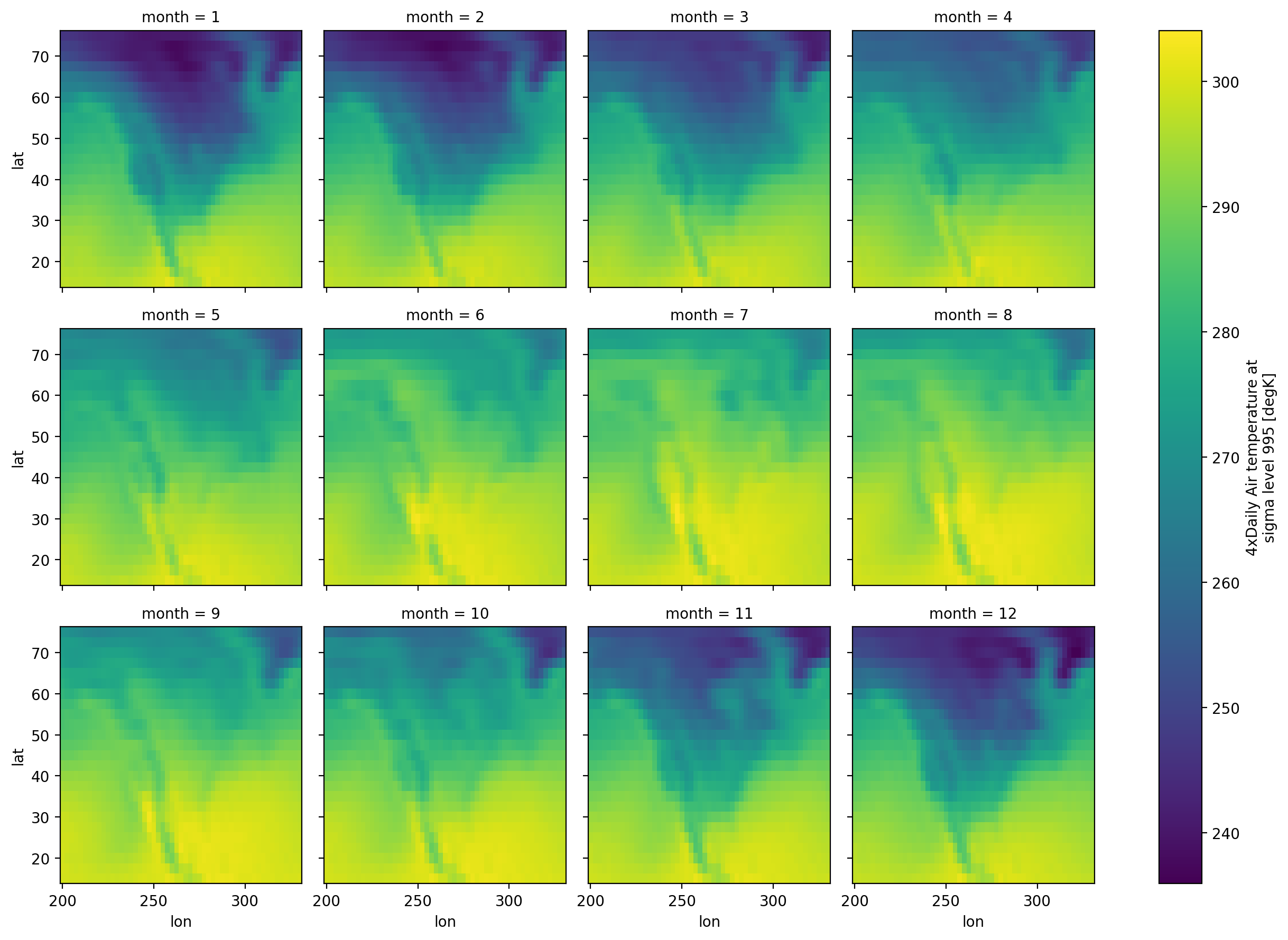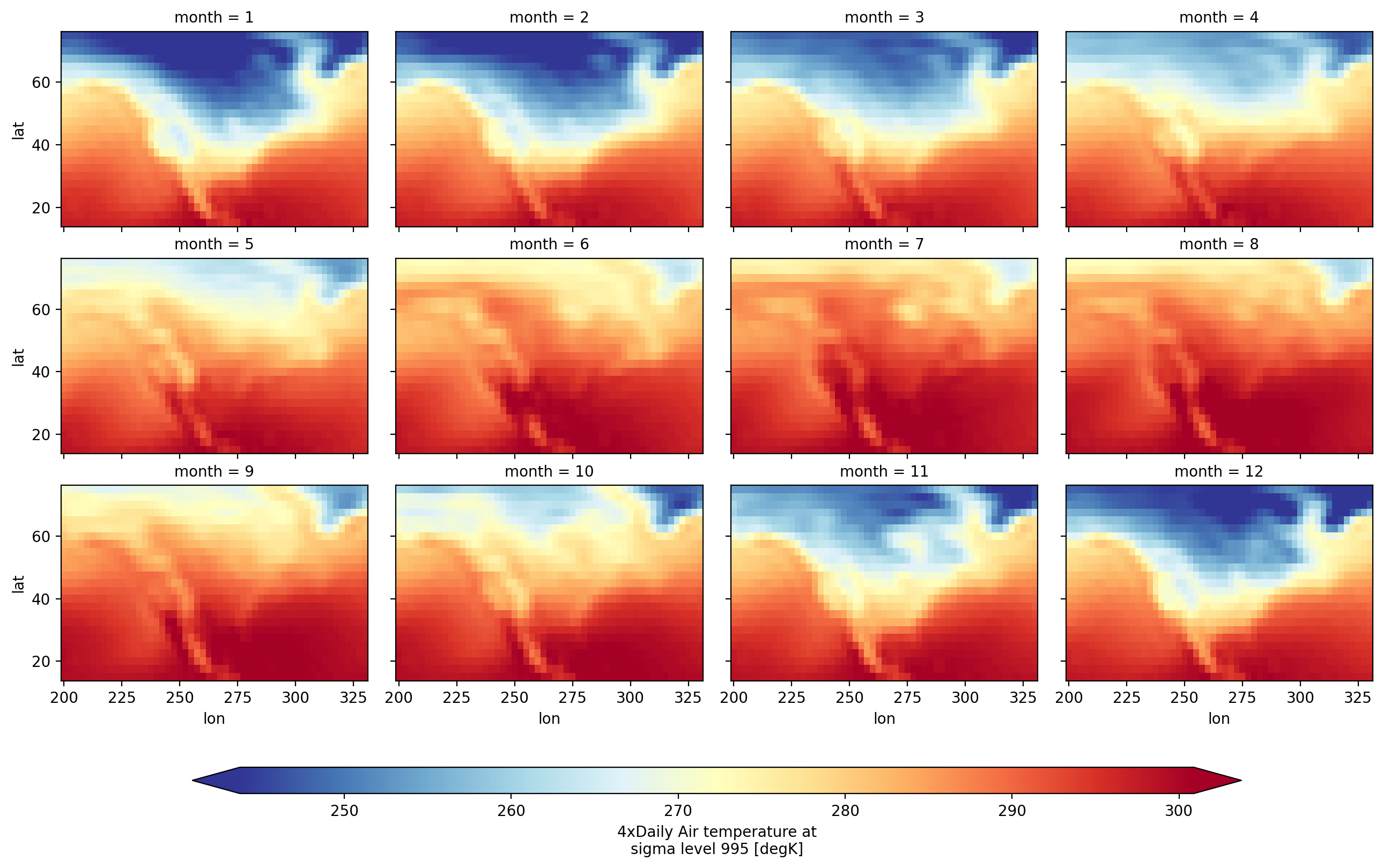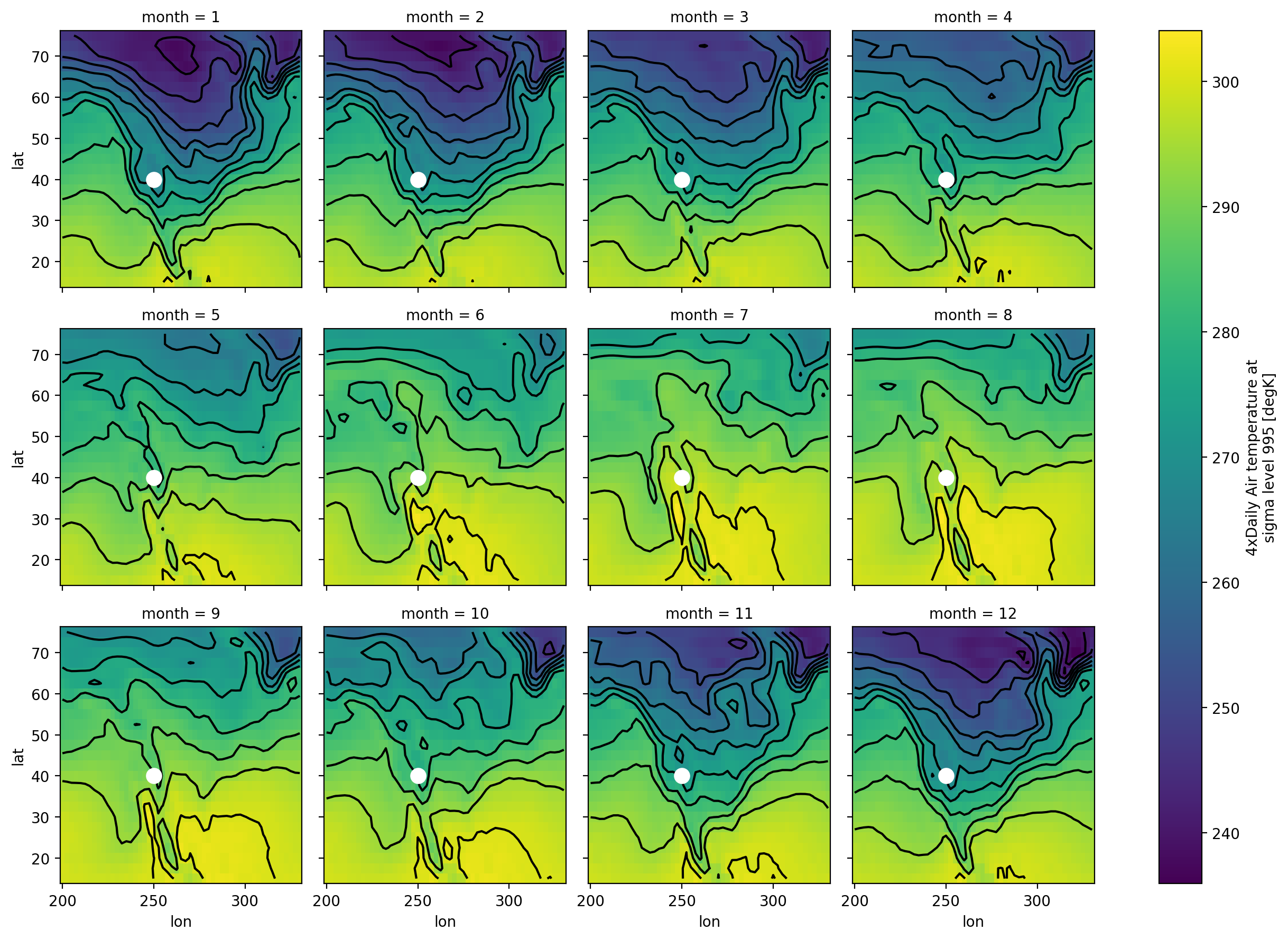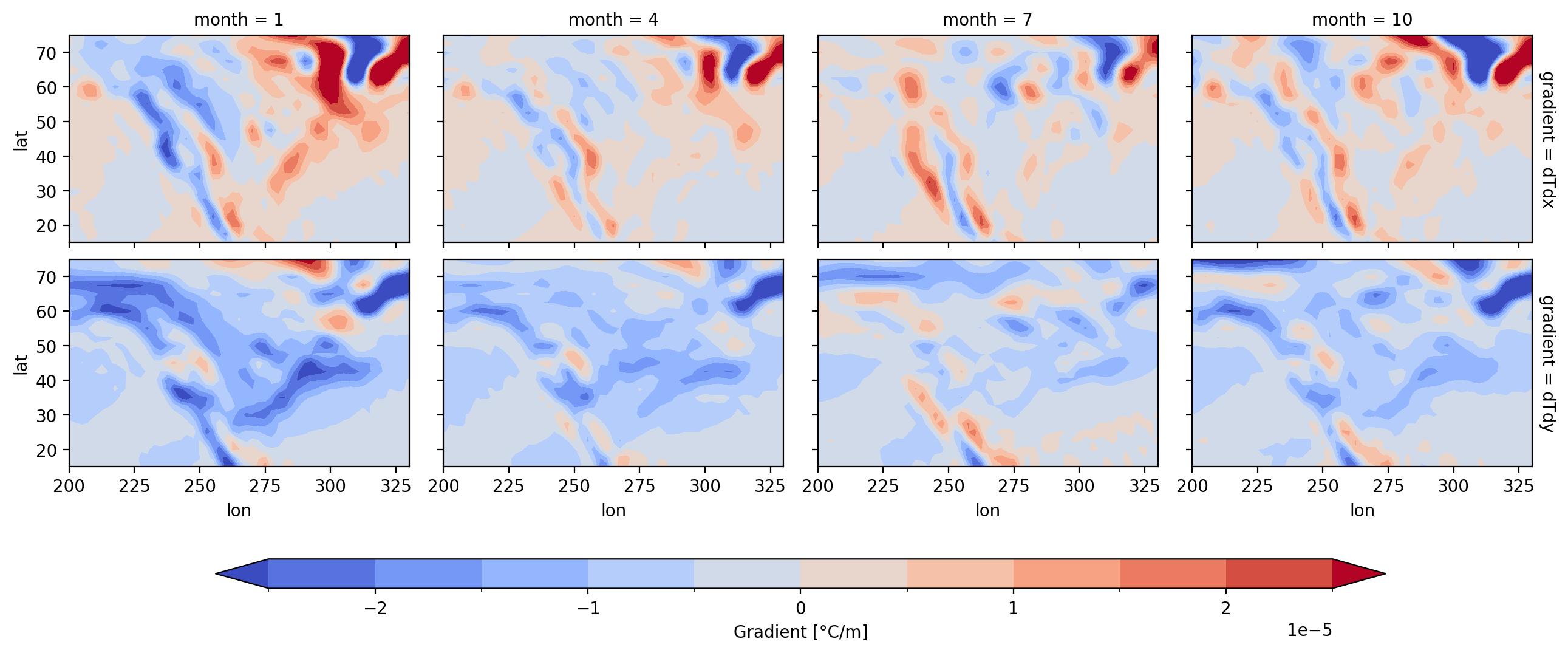Faceting#
Faceting is the art of presenting “small multiples” of the data. It is an effective way of visualizing variations of 3D data where 2D slices are visualized in a panel (subplot) and the third dimensions is varied between panels (subplots).
Here is where xarray really augments matplotlib’s functionality. We will use monthly means to illustrate
import matplotlib as mpl
import matplotlib.pyplot as plt
import numpy as np
import xarray as xr
%config InlineBackend.figure_format='retina'
ds = xr.tutorial.open_dataset("air_temperature_gradient")
monthly_means = ds.groupby("time.month").mean()
# xarray's groupby reductions drop attributes. Let's assign them back so we get nice labels.
monthly_means.Tair.attrs = ds.Tair.attrs
Note that the dimensions are now lat, lon, month.
Basic faceting#
We want to visualize how the monthly mean air temperature varies with month of the year.
The simplest way to facet is to specify the row or col kwargs which are
expected to be a dimension name. Here we use month so that each panel or
“facet” of the plot presents the mean temperature field in a given month. Since
a 12 column plot would be too small to interpret, we can “wrap” the facets into
multiple rows using col_wrap
fg = monthly_means.Tair.plot(
col="month",
col_wrap=4, # each row has a maximum of 4 columns
)

Customizing#
All the usual customizations are possible
fg = monthly_means.Tair.plot(
col="month",
col_wrap=4,
# The remaining kwargs customize the plot just as for not-faceted plots
robust=True,
cmap=mpl.cm.RdYlBu_r,
cbar_kwargs={
"orientation": "horizontal",
"shrink": 0.8,
"aspect": 40,
"pad": 0.1,
},
)

The returned FacetGrid object fg has many useful properties and methods e.g.
fg.figprovides a handle to the figurefg.axesis a numpy object array with handles to each individual axesfg.set_xlabelsandfg.set_ylabelscan be used to change axes labels.
See the documentation for a full list.
Exercise#
Use these methods to set a title for the figure using suptitle, as well as
change the x- and y-labels.
fg
<xarray.plot.facetgrid.FacetGrid at 0x7feb0388f010>
Modifying all facets#
The FacetGrid object has some more advanced methods that let you customize the plot further.
Here we illustrate the use of map and map_dataarray that let you map custom
plotting functions to an existing FacetGrid. The functions passed to map and
map_dataarray must have a particular signature. See the docstring for more
details.
Alternatively one can loop over fg.axes and modify each individual subplot as
needed
fg = monthly_means.Tair.plot(col="month", col_wrap=4)
# Use this to plot contours on each panel
# Note that this plotting call uses the original DataArray gradients
fg.map_dataarray(xr.plot.contour, x="lon", y="lat", colors="k", levels=13, add_colorbar=False)
# Add a point (or anything else!)
fg.map(lambda: plt.plot(250, 40, markersize=20, marker=".", color="w"))
<xarray.plot.facetgrid.FacetGrid at 0x7feaf2ecec50>

Faceting multiple DataArrays#
Faceting can be used to plot multiple DataArrays in a Dataset. The trick is to
use to_array() to convert a Dataset to a DataArray and then facet that.
This trick only works when it is sensible to use the same colormap and color
scale for all DataArrays like with dTdx and dTdy
gradients = monthly_means[["dTdx", "dTdy"]].to_array("gradient")
gradients
<xarray.DataArray (gradient: 2, month: 12, lat: 25, lon: 53)> Size: 127kB
array([[[[ 5.08173684e-07, -9.46942578e-07, -4.03479180e-06, ...,
1.00858488e-05, 1.81633768e-05, 2.19007525e-05],
[ 6.02189118e-07, -8.90132014e-07, -4.25928238e-06, ...,
1.44879168e-05, 3.15986872e-05, 3.92536967e-05],
[-4.04702814e-06, -4.58570503e-06, -6.01438433e-06, ...,
2.61500463e-05, 4.34150716e-05, 5.08334851e-05],
...,
[-2.34571348e-06, -1.20601771e-06, 8.53055610e-07, ...,
-1.45294723e-06, -2.20137940e-06, -2.35507150e-06],
[-2.84735904e-07, -7.32893909e-07, -6.86845681e-07, ...,
-1.83361863e-06, -1.57463614e-06, -2.10182111e-06],
[ 3.16048641e-07, -1.98249467e-07, -4.91980586e-07, ...,
-1.71716079e-06, -7.17862974e-07, -5.23411643e-07]],
[[-3.81416953e-06, -5.11973212e-06, -8.09966514e-06, ...,
1.27637104e-05, 1.81622308e-05, 2.02568535e-05],
[-4.84793247e-07, -1.95023244e-06, -5.09623078e-06, ...,
1.05404051e-05, 2.67223077e-05, 3.38635218e-05],
[-5.29987710e-06, -5.99807481e-06, -7.59168552e-06, ...,
2.05774650e-05, 3.87745931e-05, 4.66650490e-05],
...
-1.65317442e-06, -2.42777446e-06, -1.94103222e-06],
[-1.84547469e-06, -3.26857275e-06, -3.11111307e-06, ...,
-1.44888838e-06, -2.25341228e-06, -3.15753573e-06],
[-8.51903962e-07, -1.66222276e-06, -2.48365177e-06, ...,
-2.15396517e-06, -2.12524083e-06, -3.46904199e-06]],
[[-6.71428415e-06, -8.14977375e-06, -9.80123150e-06, ...,
3.74177898e-06, 2.25041845e-07, -5.66836025e-06],
[-7.73049214e-06, -6.68594612e-06, -6.57780447e-06, ...,
3.23118388e-06, -1.69362568e-06, -8.46021612e-06],
[-1.21043013e-05, -1.01668966e-05, -9.37458026e-06, ...,
-2.60197321e-05, -3.02746539e-05, -3.18970924e-05],
...,
[-1.97388658e-06, -2.87304010e-06, -2.76804826e-06, ...,
-2.31021318e-06, -2.91697165e-06, -2.45591286e-06],
[-2.12526766e-06, -3.82872440e-06, -3.59293290e-06, ...,
-2.17964885e-06, -2.80768063e-06, -3.58095190e-06],
[-1.57234820e-06, -2.31013792e-06, -2.78555922e-06, ...,
-2.83686700e-06, -2.73794444e-06, -3.87158479e-06]]]],
dtype=float32)
Coordinates:
* lat (lat) float32 100B 75.0 72.5 70.0 67.5 ... 22.5 20.0 17.5 15.0
* lon (lon) float32 212B 200.0 202.5 205.0 207.5 ... 325.0 327.5 330.0
* month (month) int64 96B 1 2 3 4 5 6 7 8 9 10 11 12
* gradient (gradient) object 16B 'dTdx' 'dTdy'
Attributes:
Conventions: COARDS
title: 4x daily NMC reanalysis (1948)
description: Data is from NMC initialized reanalysis\n(4x/day). These a...
platform: Model
references: http://www.esrl.noaa.gov/psd/data/gridded/data.ncep.reanaly...fg = gradients.isel(month=slice(None, None, 3)).plot.contourf(
levels=13,
col="month",
row="gradient",
robust=True,
cmap=mpl.cm.coolwarm,
cbar_kwargs={
"orientation": "horizontal",
"shrink": 0.8,
"aspect": 40,
"label": "Gradient [°C/m]",
},
)


